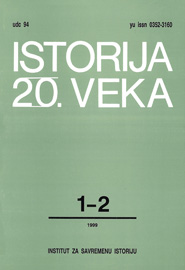GLOBALNE POSLEDICE AGRESIJE NATO NA JUGOSLAVIJU
GLOBAL REPERCUSSIONS OF THE NATO AGGRESSION AGAINST YUGOSLAVIA
Author(s): Trivo InđićSubject(s): Diplomatic history, Military history, Security and defense, Transformation Period (1990 - 2010), Geopolitics, Wars in Jugoslavia
Published by: Institut za savremenu istoriju, Beograd
Keywords: Yugoslavia; NATO; aggression; global repercussions; 90s;
Summary/Abstract: The NATO aggression against Yugoslavia, begun on 24 March 1999, has posed many questions, not only in regard to the action itself, but also to the legal nature of the alliance, and to the effect its operation has had on global relations. By taking active part in the disintegration of Yugoslavia in the period 1991 to 1995, NATO wished to justify its existence following the fall of the Berlin Wall and the dissolution of the Warsaw Pact. As a result of US diplomacy, NATO managed to obtain a hitherto unthinkable concession from the UN Security Council, which allowed it to interfere in the Yugoslav conflict, and to become the armed force of the UN outside the territory to which NATO was originally limited by the founding agreement. NATO thus continued to realize the geopolitical, economic, and other interests of the members of this alliance, headed by the US. Taking advantage of the momentary weakness of its main rivals, Russia and China, the US used the NATO intervention in Yugoslavia to demonstrate its supremacy in global relations today. NATO, originally created for defensive purposes, was turned into an offensive alliance with global aspirations, serving US interests. These interests include the obstruction of the European Union, as an economic and political rival, and of Russia and China, as the forces with the potential to effectuate the policy of multi-polarity in global relations, and they rely on the strategy of using political, ethnic, religious, and other conflicts in the world for the achievement of US objectives. NATO aggression against Yugoslavia has revived the atmosphere of the cold war in global relations, and has prompted the race in armament and the growth of military budgets. After the initial positive results achieved in the beginning of the 90-ties, global disarmament seems to have been forgotten, while a growing number of countries, particularly the US, have turned to increasing their budgets for the acquisition and modernization of arms. The ratification of the main international agreements regarding strategic nuclear weapons control (START-2, START-3) has been postponed. At the same time, even small countries are trying to obtain "absolute" weapons, ballistic missiles, and nuclear bombs in order to be able to defend themselves or to retaliate in the event they should be subjected to the same treatment as Yugoslavia. The UN was given a marginal role in this conflict, confirming the longstanding disdain of the US for the organization which is the only guarantee of global order in international relations. The principle of sovereignty is thus defied, and aggression is justified by arbitrary arguments of supposedly humanitarian intervention. Russia and China have also been bypassed, both as members of the Security Council, and as countries involved in the Balkan conflict. They have been forced to reconsider their relations with the US, to make a critical assessment of NATO’s new global strategy, and to try and find a counterbalance for it in new, regional forms of military, political, and economic cooperation, in addition to making significant investments in the development of their own military forces. According to these two countries, the aggressive trend toward global domination, headed by the US, can be prevented by encouraging multi-polarity in global relations. The European Union was used in this conflict, and was subordinated to the interests of NATO and the US. This has given rise to controversy regarding the need for the organization to have its own foreign and security policy, and to form an independent armed force. It has also led to conflicts between political factors; between executive authorities and parliament, between political parties, and between public opinion and official policy. A chapter deals with the consequences of the NATO aggression on international law, and the role of the International Court of Justice in the Hague, and the International Criminal Court for the former Yugoslavia.
Journal: Istorija 20. veka
- Issue Year: 1999
- Issue No: 1+2
- Page Range: 127-158
- Page Count: 32
- Language: Serbian

